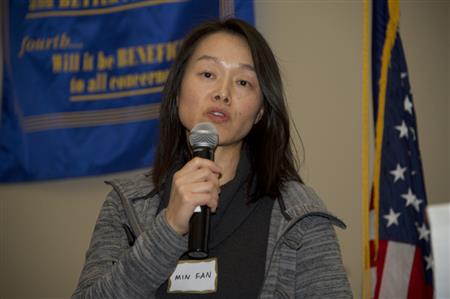 Last Wednesday our guest speaker, Min Fan, was introduced by Bill Timpson, RCFC’s resident Peace advocate. A cultural bridge-builder Min believes that “bridges” can be built not only with concrete and steel but with friendship and communication. The process involves reflection, discussion, and action.
Last Wednesday our guest speaker, Min Fan, was introduced by Bill Timpson, RCFC’s resident Peace advocate. A cultural bridge-builder Min believes that “bridges” can be built not only with concrete and steel but with friendship and communication. The process involves reflection, discussion, and action. Min Fan is Executive Director of the United States Heartland China Association (USHCA), which promotes exchanges in culture, education and business to foster a positive, productive and mutually beneficial relationship between U.S. and China. Before joining USHCA, Min led a Houston based nonprofit that promoted innovation collaboration between U.S. and Chinese. Over 100 U.S. companies visited China in the past 2 years as a result of her efforts.
Min Fan was born in China and immigrated to the US in 1993. She shared her personal story along with photographs. Min was 8 years old in 1979 when 2 significant events occurred - normalization of U.S. - China relationship and the implementation of the 1-child policy by the Chinese government. Times were hard - people were poor and essentials were rationed. She was required to attend one year of military training before she was able to attend Peking University in 1991, and, when international studies became available, she joined the growing number of Chinese students coming to the U.S. and transferred to the University of North Carolina. Just like all the other Chinese international students in U.S., Min had to overcome significant language and culture obstacles at the beginning. Following her graduation with an MBA, she went on to a successful career with Hewlett Packard and eventually became a leader in organizational creativity and innovation.
When Min returned to China she noted many changes. The Chinese economy had almost caught up to US in a remarkably short time and China has started to demonstrate its global ambitions through growing financial aid to other developing countries. The question becomes how can the two largest economies of the world today grow together and treat each other as equals?
Even more broadly, what are the global peace implications of the growing tension and conflicts between U.S. and China - trade wars, intellectual property disputes, cyber war, etc.? What are the implications of an increasing Pentagon budget and decreasing resources for the US State Department and diplomacy?
Organizations such as US Heartland China Association, Rotary International (the Shanghai Club was founded about the same time as RCFC), student exchanges, local government exchanges (eg, mayors), groups with common interests (eg farmers) can all contribute to better communication, understanding and ultimately, world peace.